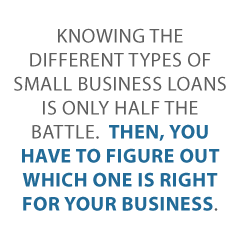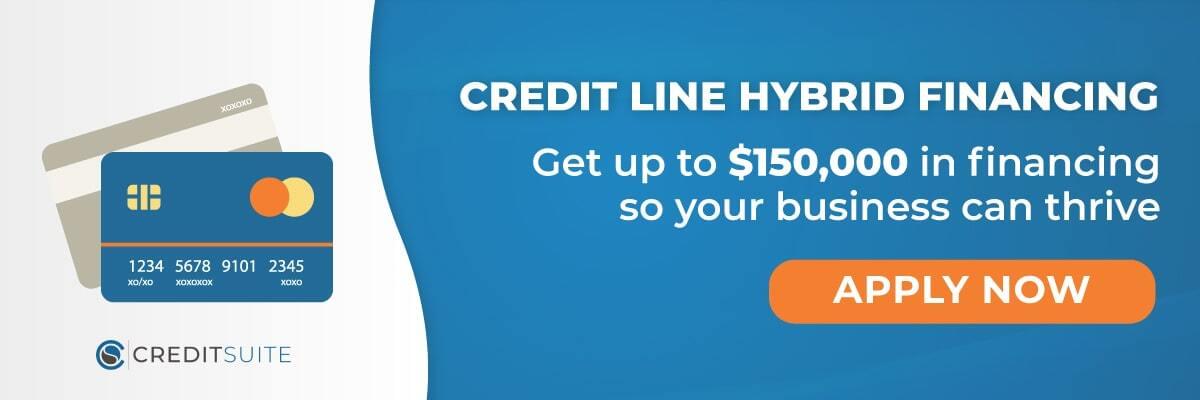Businesses need funding. It’s that simple. You would be hard pressed to find a business owner that doesn’t know that. However, what many do not know, is that there are more options than just traditional bank loans. In fact, here are 6 different types of small business loans, and that is just the tip of the iceberg.
7 Types of Small Business Loans and Which One Is Right for You
Knowing the different types of small business loans is only half the battle. Then, you have to figure out which one is right for your business. The answer will depend on a number of things. Sometimes, you may not even get a choice. You may have to take what you can qualify for. Still, knowing your options is the first step. Then, you can work on putting your business in a position to qualify for what will work best if you aren’t there yet.
What Types of Small Business Loans are Most Common?
-
Types of SBA Loans
There are several types of SBA loans. These are small-business loans guaranteed by the Small Business Administration and issued by participating lenders, mostly banks. They can guarantee up to 85% of loans of $150,000 or less, and loans that are more than $150,000 they will guarantee up to 75%. The maximum loan amount they offer is $5 million.
Due to the fact that these are SBA loans, meaning that they have a government guarantee, financial institutions are able to offer them at lower interest rates.
Credit Line Hybrid Financing: Get up to $150,000 in financing so your business can thrive.
What are the SBA Loan Options?
Again, there are many types of SBA loans for various kinds of businesses and needs. Here are just a few.
7(a) Loans
This is the Small Business Administration’s flagship loan program. It offers federally funded term loans up to $5 million. The funds can be used for expansion, purchasing equipment, working capital and more. Banks, credit unions, and other specialized institutions, in partnership with the SBA, process these loans and disburse the funds.
504 Loans
These loans are also available up to $5 million and can buy machinery, facilities, or land. They are generally used for expansion. Private sector lenders or nonprofits process disburse the funds. Specifically, they work well for commercial real estate purchases.
Microloans
Microloans are available in amounts up to $50,000. They work for starting a business, purchasing equipment, buying inventory, or for working capital. Contrary to most other SBA loan programs, financing comes directly from the Small Business Administration, with community based non-profits acting as intermediaries.
SBA disaster loans
Available in amounts up to $2 million, these funds are processed directly through the SBA as well. They are available to small-business owners that have been affected by natural disasters.
SBA Express loans
The turnaround for express loans is much faster, with the SBA taking up to 36 hours to give a decision. Necessary paperwork for application is less also, making express loans a great option for working capital, among other things, if you qualify.
What Are the Best Government Small Business Loans?
The 7(a) program is by far the most versatile. The funds can be used for a number of business needs. If you qualify, they are a great option. Credit Suite can help you get funding through this program.
-
Types of Small Business Loans: 401(k) Financing
Your existing 401(k) or IRA can help fund your business as well. The funds work as collateral for business financing. This program uses IRS proven strategies. Furthermore, you will pay no tax penalties, and you still earn interest on your 401(k). Rates are low, and this option usually has a quick closing and funding process as well.
-
Types of Small Business Loans: Merchant Cash Advances
If you accept credit cards as payment, you may qualify for a merchant cash advance. The minimum credit score is 500. Also, your business must bring in $100,000 or more per year in credit card sales. Typical approval amounts equal one months’ credit processing volume. So, you’ll also need 3-6 months of bank and merchant statements.
-
Types of Small Business Loans: Equipment Financing
This is one way to get financing to buy or lease new equipment. Rates vary widely based on risk factors, but usually you can get approval with a credit score of 650 or better.
The lender will undervalue equipment by perhaps up to 50%. Remember, this is on major equipment only. Lenders won’t combine a lot of small equipment. You can get loans up to $2 million.
Equipment Sale – Leaseback
If you already own your equipment free and clear, you can use it as collateral for financing. The process involves selling the equipment to a lender for cash. Then, you lease it back from them. You need at least one larger piece of higher value equipment to qualify, and you can get funding in as little as 3 weeks.
Credit Line Hybrid Financing: Get up to $150,000 in financing so your business can thrive.
-
Types of Small Business Loans: Credit Line Hybrid
One type of loan many business owners do not know about is the credit line hybrid. It allows you to fund your business with no collateral and typically very low interest rates. No financials are required. Furthermore, it reports to the business credit reporting agencies. As a result, you build business credit, which will help you access more funding in the future.
-
Types of Small Business Loans: Traditional Business Lines of Credit
A traditional business line of credit is like a cross between a traditional loan and a business credit card. You go through a traditional bank and apply just like you would a loan. It may be collateral based or not, depending on your lender’s requirements. You may also use a guarantor to help reduce rates and get better terms if needed.
The difference between a traditional loan and a traditional business line of credit is that the line of credit is revolving credit rather than a term loan. Like a credit card, you only pay back what you use. Also, lines of credit typically have lower interest rates than business credit cards. The trade off is, there are no rewards like cash back or air miles.
What is the Best Type of Loan for My Business?
Truthfully, the answer to this question varies. It depends on the specific situation your business is in at the specific time you need funding. The answer now may not be the answer later. However, here are some ideas of types of small businesses and situations that each option may work well for.
SBA Loans
SBA government loans are an option for many business owners that find themselves stuck in the middle. For example, they may not qualify for a straight traditional loan, but still want to benefit from the lower rates and better terms these loans can offer. With a credit score slightly below what the banks typically require, many business owners can qualify for these government guaranteed loans.
401(k) Financing and Equipment Financing
These types of small business loans are great for those business owners that have these assets to leverage. They offer low rates and do not require credit scores as high as some other options. In fact, with the 401(k) financing, credit really isn’t an issue at all. The trick is, you just have to have a 401(k). If you do, and meet the requirements, these options can be a great way to get business funding
Merchant Cash Advance
This program is ideal for business owners who accept credit cards and need cash fast. See, an MCA program is designed to help you get funding based strictly on your cash flow. As a result, you usually only have to provide your business bank statements. Generally, you do not have to submit a ton of documents.
You can get a merchant cash advance through Credit Suite. In fact, our merchant financing program is perfect for business owners with credit issues. Honestly, lenders are not looking for, nor do they require good credit to qualify. You can be approved for as much as $500,000 in financing with no collateral requirements and bad credit.
Credit Line Hybrid
Maybe you do not do a lot of credit card business and still need funding. In that case, the credit line hybrid may be for you. You can usually get a loan of 5x the amount of your highest revolving credit limit account, up to $150,000. Honestly, this is more than what you could get on your own when applying for credit cards. Furthermore, you can get cash out on this program.
Credit Line Hybrid Financing: Get up to $150,000 in financing so your business can thrive.
Also, there is no impact on your personal credit with this type of financing. You need a 680+ credit score, but if you don’t meet that you can take on a credit partner who does. A lot of business owners use the good credit of friends or family to help them get the funding they need.
Traditional Merchant Cash Advance
If you have strong personal credit and want the flexibility of revolving credit without the interest rates of a credit card, then this is for you.
What are the Best Types of Small Business Loans?
The answer to this question is not as cut and dry as it may seem. There are a number of factors that make a difference. First, it depends on the needs of your business. Then, you have to consider what types of small business loans your business actually qualifies to get.
The key to ensuring not only that you get the business funding you need right now, but that you are eligible for the best funding options for your business in the future, is to work with a business credit expert. They can guide you to the best funding now, and help you put yourself in a position to have even better options next time.
The post Comparing Types of Small Business Loans appeared first on Credit Suite.



